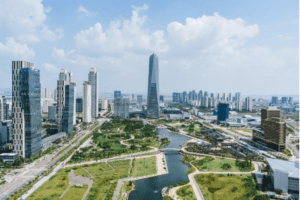
Since the inception of human civilization, master-planned cities have always existed – from the development of the ancient Mediterranean port city of Alexandria to the inauguration of Brasilia as Brazil’s capital in the mid-20th century. What do these cities have in common? They were all completely built from scratch. In the past half-century, globalizing forces accentuated by free-market policies from Western countries such as the United States and Great Britain have accorded substantive capital flows into developing countries. Specifically, countries in Africa, the Middle East and Asia have become focal destinations for such capital inflows. Master-planned cities have become an increasingly attractive investment for corporations with over 100 projects designed or under construction since the mid-1990s across the globe.
In recent years, South Korea has announced it will build around 15 “ubiquitous cities” that will seek to utilize state of the art technology to develop integrated urban systems. The most impressive of them all is New Songdo or the Songdo International Business district which is the world’s first smart city built entirely from scratch. Built on 1,500 acres of land reclaimed from the Yellow Sea in Incheon, it is the largest private real estate project in history – costing US $35 billion. It seeks to consolidate residential, medical and business information systems, using technology such as “mobile health-sensor” technologies to monitor and manage the health conditions of senior citizens.
However, looking at the Songdo development from another perspective, the project might not be as impressive. One developer, U.S-based Gale International, has a mammoth 70% stake in the project and its South Korean partner, Posco Engineering & Construction holds the remaining 30%. Lack of diversity within the group of actors undertaking the development voids the opportunity for the city to evolve naturally – adapting to challenges presented over a period of time. Moreover, an average condo in Songdo costs between US $500,000 and $1.5 million compared to an average of US $250,000 in Busan, South Korea, the second most populous city in South Korea. It is evident that the project is deliberately targeted towards wealthy businesspeople as most Koreans are not able to afford these prices.
Similarly, in Africa, the “mega-urbanization” facilitated by large-scale developers must be scrutinized to ensure that the welfare of the people is at the heart of any new development. Ideals of Westernization enforced upon the global ecosystem through formalized institutions are bound to significantly alter the African way of life in the future, and policymakers must tread carefully to ensure that the built environment reflects African culture and values. Martin Murray, a Professor of Urban Planning at Taubman College, states the following in his examination of large-scale, master-planned redevelopment projects in Africa:
“If these ambitious approaches to city building successfully move beyond the design phase and reach the stage of actual implementation, many large metropolises in Africa will be fundamentally reconfigured to more explicitly serve the aims and interests of large-scale transnational corporate investors, local business coalitions, and affluent consumers wanting to be plugged into the global economy.”
The sad reality is that many of these projects will serve to heighten the interests of not only the aforementioned parties, but also elites in government. The World Bank figures that 90% of rural land is not formally documented meaning that the current state of substandard property rights will need to be transformed to avoid issues of land grabbing. Customary uses of land, such as agriculture, are increasingly becoming vulnerable to private intervention as the economies of African countries liberalize. According to Transparency International, Sub-Saharan Africa has an average of 32 on the Corruption Perceptions Index (CPI) – making it the lowest scoring region on the CPI. As such, the collaboration between the public and private sectors in African countries do not have the appropriate institutional checks and balances to create cities that amalgamate historical and cultural aspects of African society. Instead, Western ideals of development will likely prevail.
Then come the questions: what are these cities trying to accomplish and who are they catered for? Many proposed cities such as Eko Atlantic in Nigeria and Konza Techno City in Kenya are marketed as economic drivers impelling new growth in globally competitive sectors such as technology. However, inaugurating these highly sought-after sectors requires patience and calculated policy initiatives over an extended period. Moving from a traditional society dependent on subsistence, agriculture and barter to an economy that is highly complex with integrated knowledge systems and high mass consumption is an arduous process that takes decades to build. Therefore, utilizing master-planned cities to spur such growth appears to be inefficient especially considering these developments are often leveraged as a power grab for private and public actors.
Urban development necessitates public discourse and should involve a diverse set of actors to ensure that the built environment reflects this diversity. For master-planned cities to be successful, especially in non-democratic states, it is crucial for private actors to create democratic processes that involve the community in development initiatives, as public institutions can be undependable when it comes to the dispersion of public goods.
Leave a Reply